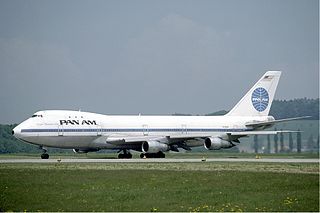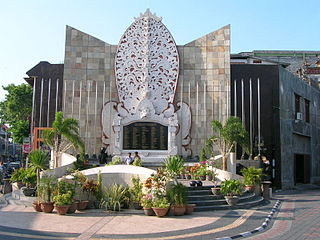
The 2002 Mombasa attacks were a two-pronged terrorist attack on 28 November 2002 in Mombasa, Kenya against an Israeli-owned hotel and a plane belonging to Arkia Airlines. An all-terrain vehicle crashed through a barrier outside the Paradise Hotel and blew up, killing 13 and injuring 80. At the same time, attackers fired two surface-to-air missiles at an Israeli charter plane. The Paradise Hotel was the only Israeli-owned hotel in the Mombasa area. The attacks were believed to be orchestrated by al-Qaeda operatives in Somalia in an attempt to disrupt the Israeli tourist industry on the African continent. Much speculation has occurred as to who the perpetrators are, but no complete list of suspects has been defined. The attack was the second al-Qaeda terrorist operation in Kenya, following the bombing of the U.S. embassy in Nairobi in 1998. Following the attack, the UN Security Council and other nations condemned the bombing.
Wadih Elias el-Hage is a Lebanese and naturalized American citizen, who is serving life imprisonment in the United States based on conspiracy charges relating to the 1998 United States embassy bombings.

Abdullah Ahmed Abdullah was a high-ranking Egyptian member of al-Qaeda. He has been described as al-Qaeda's most experienced operational planner and was said to be the second-in-command in the organization at the time of his death.

Muhsin Musa Matwalli Atwah was an Egyptian national wanted by the United States government.

United Nations Security Council resolution 1566, adopted unanimously on 8 October 2004, after reaffirming resolutions 1267 (1999), 1373 (2001) and 1540 (2004), the Council condemned terrorism as a serious threat to peace and strengthened anti-terrorism legislation.

Ahmed Mohammed Hamed Ali was an Egyptian national wanted by the United States government in connection with the 1998 United States embassy bombings in Dar es Salaam, Tanzania, and Nairobi.

The 1998 United States embassy bombings were attacks that occurred on August 7, 1998. More than 220 people were killed in two nearly simultaneous truck bomb explosions in two East African capital cities, one at the United States embassy in Dar es Salaam, Tanzania, and the other at the United States embassy in Nairobi, Kenya.
Adel Mohammed Abdel Magid Abdel Bari is an Egyptian terrorist.

Tanzania – United States relations are bilateral relations between Tanzania and the United States.

UN Security Council Resolution 731 was adopted unanimously on 21 January 1992, after the Council recalled resolutions 286 (1970) and 635 (1989), which condemned acts of terrorism; the Council expressed concern over the results of investigations into the destruction of Pan Am Flight 103 over Lockerbie, Scotland, and UTA Flight 772 over Chad and Niger, which implicated officials from the Government of Libya.

United Nations Security Council resolution 1044, adopted unanimously on 31 January 1996, after noting the assassination attempt on President of Egypt Hosni Mubarak at an Organisation of African Unity (OAU) summit in the Ethiopian capital Addis Ababa on 26 June 1995, demanded that the Government of Sudan comply with OAU requests to extradite suspects sheltered in the country to Ethiopia.

United Nations Security Council resolution 1187, adopted unanimously on 30 July 1998, after reaffirming all resolutions on Georgia, particularly Resolution 1150 (1998), the Council extended the mandate of the United Nations Observer Mission in Georgia (UNOMIG) until 31 January 1999, and discussed recent hostilities in the country.
United Nations Security Council resolution 1269, adopted unanimously on 19 October 1999, after expressing concern at the increasing number of acts of international terrorism, the Council condemned terrorist attacks and called upon states to fully implement anti-terrorist conventions. It was the first time the Security Council had addressed terrorism in a general manner, though it did not define what constituted terrorism.

United Nations Security Council resolution 1388, adopted unanimously on 15 January 2002, after recalling resolutions 1267 (1999) and 1333 (2000) on the situation in Afghanistan, the council, acting under Chapter VII of the United Nations Charter, lifted sanctions against Ariana Afghan Airlines as the airline was no longer controlled by or on behalf of the Taliban.
United Nations Security Council resolution 1390, adopted unanimously on 16 January 2002, after recalling resolutions 1267 (1999), 1333 (2000), 1363 (2001), 1368 (2001), 1373 (2001) 1378 (2001) and 1383 (2001) concerning the situation in Afghanistan and terrorism, the Council imposed further sanctions on Osama bin Laden, Al-Qaeda, the Taliban and others associated with them.

United Nations Security Council Resolution 1438, adopted unanimously on 14 October 2002, after reaffirming the principles of the United Nations Charter and Resolution 1373 (2001), the Council condemned the bombings in Bali, Indonesia.

United Nations Security Council resolution 1450, adopted on 13 December 2002, after reaffirming the principles of the United Nations Charter and resolutions 1189 (1998), 1269 (1999), 1368 (2001) and 1373 (2001), the Council condemned the attacks on Israeli targets in Kikambala and Mombasa, Kenya on 28 November 2002.
United Nations Security Council resolution 1526, adopted unanimously on 30 January 2004, after recalling resolutions 1267 (1999), 1333 (2000), 1363 (2001), 1373 (2001), 1390 (2001), 1452 (2002) and 1455 (2003) concerning terrorism, the council tightened sanctions against Al-Qaeda, the Taliban, Osama bin Laden and associated individuals and groups.

United Nations Security Council resolution 1530, adopted unanimously on 11 March 2004, after reaffirming the principles of the United Nations Charter and Resolution 1373 (2001), the council condemned the train bombings in Madrid, Spain, on 11 March 2004. It was passed hours after the attacks.

Many terrorist attacks have occurred in Kenya during the 20th and 21st centuries. In 1980, the Jewish-owned Norfolk hotel was attacked by the Palestine Liberation Organization (PLO). In 1998, the US embassy was bombed in Nairobi, as was the Israeli-owned Paradise hotel in 2002 in Mombasa. In 2013, the Somali jihadist group al-Shabaab killed 67 people at Nairobi's Westgate Shopping Mall. There have also been many other attacks.














